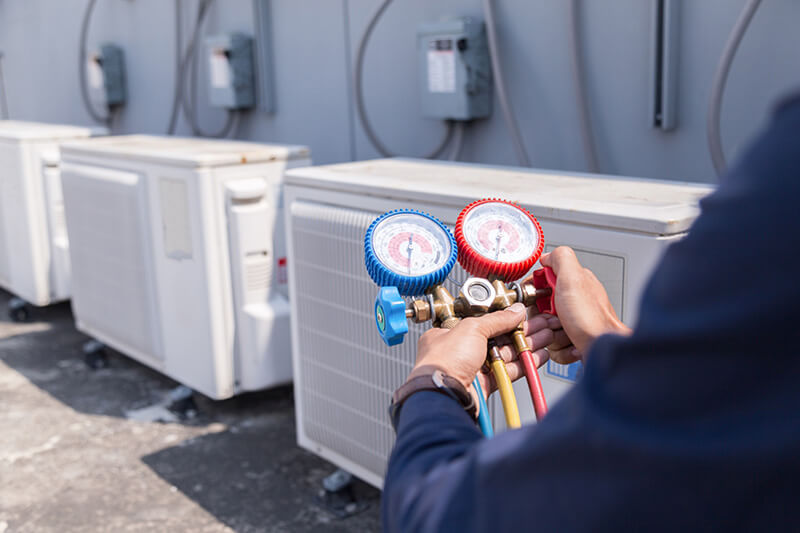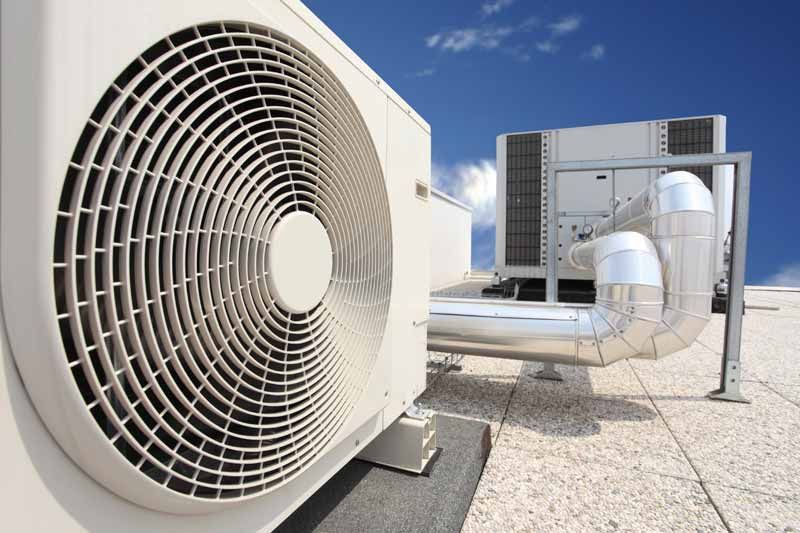Picking In Between a Warmth Pump and Heater: Secret Factors To Consider for Your Cooling And Heating Needs
When evaluating home heating alternatives for cooling and heating requires, the decision between a heat pump and a heater can be complicated. Each system supplies distinctive advantages tailored to details environments and energy efficiency goals. Comprehending these distinctions is necessary for making an educated selection. Secret aspects such as installment expenses and environmental effect even more complicate the choice process. Which option genuinely lines up with one's convenience and sustainability preferences? The complying with areas will discover these factors to consider thoroughly.
Understanding Heat Pumps: Exactly How They Function and Their Advantages
While numerous property owners think about numerous home heating alternatives, understanding exactly how heatpump function and their benefits can considerably affect their choice. Warmth pumps operate by transferring heat instead of creating it. In the winter months, they draw out warmth from the outside air or ground and transfer it inside, while in the summertime, they reverse this procedure, cooling the home by getting rid of warmth outside. This twin performance makes them functional for year-round climate control.One of the key advantages of heatpump is their energy effectiveness. They make use of substantially less power compared to conventional home heating systems, potentially causing reduced utility expenses (heat pump installation ooltewah tn). Additionally, heatpump have a smaller sized carbon footprint, making them an environmentally friendly selection. They also need much less upkeep than conventional systems, adding to long-lasting price financial savings. On the whole, comprehending the auto mechanics and benefits of heatpump can aid house owners make educated decisions concerning their heating and cooling down requirements
Exploring Furnaces: Types, Operation, and Advantages
Heating systems come in various types, including gas, electrical, and oil versions, each with unique operational systems. Comprehending these distinctions is important, as they impact effectiveness and home heating performance. Additionally, heaters use numerous benefits, such as regular warm outcome and integrity in cooler environments.
Types of Heaters
Heating unit can vary significantly in style and operation, with heating systems being a prominent selection amongst home owners. There are a number of kinds of furnaces, each making use of different gas resources and modern technologies. Gas furnaces prevail, leveraging gas to generate warm effectively. Electric heating systems, on the other hand, make use of electric resistance to generate warmth, typically preferred for their uncomplicated installation. Oil heaters, while less usual, work in areas with restricted gas access (heat pump replacement ooltewah tn). Furthermore, condensing heaters take full advantage of energy efficiency by reusing and capturing exhaust gases. Each kind operates via a system of warm exchangers and ductwork to distribute cozy air throughout a home. Recognizing the differences in between these heating system kinds is essential for informed a/c choices
Advantages of Furnaces
For property owners seeking dependable heat during cold months, the benefits of furnaces are significant. Heaters provide constant heating, guaranteeing also temperature levels throughout the home. They are particularly reliable in extreme chilly, often exceeding warmth pumps in icy conditions. Various kinds, consisting of gas, electrical, and oil heaters, offer flexibility to meet varied requirements and preferences.Furnaces additionally often tend to have lower initial installation prices compared to heat pumps, making them a more easily accessible alternative for several. Their durable design contributes to a longer life expectancy, with numerous devices lasting over 15 years with correct maintenance. Additionally, modern furnaces are typically furnished with advanced modern technology for improved effectiveness, which can cause decreased energy expenses. In general, furnaces remain a reliable choice for effective home heating.

Power Efficiency: Contrasting Warmth Pumps and Furnaces
When contrasting power effectiveness in between warm pumps and furnaces, the Seasonal Energy Effectiveness Proportion (SEER) plays a crucial function in determining efficiency. In addition, a functional expense analysis discloses the long-term monetary ramifications of each system. Understanding these elements can assist property owners in making educated choices concerning their home heating services.
Seasonal Energy Effectiveness Proportion
Energy effectiveness plays an essential role in the decision-making procedure between heat pumps and heating systems, particularly when considering the Seasonal Energy Effectiveness Proportion (SEER) This statistics measures the cooling efficiency of heat pumps over an entire cooling season, offering a standardized means to review efficiency. Greater SEER rankings show better energy effectiveness, equating to lower energy consumption and lowered utility bills. In contrast, furnaces are commonly assessed using the Annual Fuel Use Performance (AFUE) rating, which mirrors home heating efficiency. When comparing these two systems, house owners need to focus on SEER scores for warmth pumps, as they straight effect overall energy savings and ecological sustainability. A thorough understanding of SEER can especially influence the lasting fulfillment and cost-effectiveness of the picked HVAC remedy.
Operational Price Analysis
Understanding the operational prices connected with heatpump and heaters is vital for property owners assessing their options. Heatpump typically supply greater power effectiveness, converting electrical energy right into warm with minimal waste. This leads to lower month-to-month utility bills, especially in moderate environments. index Conversely, conventional furnaces, especially gas versions, may have lower upfront prices yet can incur greater functional costs over time as a result of fuel costs and efficiency ratings.Moreover, heatpump can operate as both heating and cooling down systems, potentially minimizing the demand for separate HVAC systems. While first investments for warmth pumps may be higher, their long-lasting financial savings in energy effectiveness reference can make them an extra cost-efficient choice for lots of houses. Mindful evaluation of neighborhood energy prices is necessary to figure out the ideal choice.
Installation Costs: What to Anticipate for every Home Heating System
Installment prices for furnace can vary considerably between heatpump and furnaces, influencing property owners' decisions. Warm pumps normally have greater ahead of time setup expenses, normally ranging from $3,500 to $8,000, depending on the unit size and complexity of setup. This includes the outdoor unit, interior handling system, and required ductwork adjustments. On the other hand, heaters have a tendency to have lower preliminary expenses, averaging in between $2,500 and $6,000, which can be appealing for budget-conscious house owners. Setup expenses can raise if considerable ductwork is required.Moreover, the selection of gas type for furnaces-- natural gas, gas, or electric-- can also influence installment expenses. While heatpump use energy performance, their first investment may hinder some purchasers. Inevitably, reviewing installment prices along with long-lasting savings and performance will certainly assist homeowners in making notified decisions regarding their furnace.
Climate Considerations: Which System Executes Much Better in Your Location
Just how do climate problems influence the performance of furnace? The performance of warmth pumps and heating systems can differ substantially depending upon the neighborhood climate. In moderate climates, heatpump stand out by effectively transferring warmth from the outdoors air, making them an energy-saving choice. Nonetheless, their effectiveness diminishes in extremely cold temperature levels, where they may have a hard time to draw out enough heat. Conversely, heating systems, specifically gas versions, offer trusted and consistent warmth no matter outdoor problems, making them preferable in colder regions.In areas that experience milder winters months, heat pumps can operate successfully year-round, offering both home heating and air conditioning. On the other hand, areas with rough winters commonly profit from the toughness of heating systems. Inevitably, recognizing the regional climate is vital when making a decision between a heatpump and a heater, as it directly impacts their functional effectiveness and general efficiency.
Upkeep Demands: Long-Term Take Care Of Warmth Pumps vs. Furnaces
While both heatpump and furnaces require regular maintenance to guarantee peak performance, their certain needs and treatment routines vary substantially. Heating systems usually need less regular interest, with annual examinations being adequate to look for gas leakages, clean filters, and evaluate total capability. Their easier layout typically enables straightforward repairs.In comparison, heatpump necessitate biannual maintenance because of their double function in cooling and heating. This includes cleansing coils, examining cooling agent levels, and making sure that both the outdoor and interior units work at their finest. Additionally, warm pump upkeep typically involves more detailed elements, making professional servicing essential.Neglecting upkeep can lead to reduced efficiency and boosted power prices for both systems. Eventually, home owners ought to think about these long-term treatment demands when picking in between a heatpump and a heating system, as positive upkeep can prolong the life-span and performance of either system significantly.
Ecological Influence: Selecting a Lasting Home Heating Option
The environmental impact of home heating systems is a vital analysis for house owners seeking lasting options. Heatpump are typically a lot more energy-efficient than standard heaters, as they move warmth as opposed to generate it, significantly minimizing carbon discharges. By utilizing eco-friendly power resources, such as geothermal or air-source heatpump, property owners can even more decrease their ecological footprint.On the other hand, gas heaters release greenhouse gases and add to air contamination, though they often give higher warmth result. Innovations in innovation have actually led to the development of high-efficiency heaters that decrease emissions.Ultimately, selecting a heating system includes weighing effectiveness against ecological effect. Property owners are motivated to review regional power resources and motivations for eco-friendly systems, ensuring a selection that lines up with both individual comfort and ecological obligation. The choice affects not check this site out just instant convenience but likewise long-term sustainability and environmental health.
Often Asked Inquiries
For How Long Do Heat Pumps and Furnaces Usually Last?
The lifespan of heatpump normally ranges from 15 to two decades, while heaters can last in between 15 to 30 years. Routine upkeep significantly influences their longevity and effectiveness in supplying home heating solutions.
Can I Utilize a Heatpump in Exceptionally Cold Climates?
Heat pumps can operate in very chilly climates, but their effectiveness decreases as temperature levels drop. In such problems, additional home heating resources may be needed to maintain comfy indoor temperatures and ensure peak efficiency.

What Is the Sound Degree of Warmth Pumps Versus Furnaces?
The noise degrees of heatpump and furnaces differ significantly. Normally, heatpump operate even more quietly than typical heaters, making them more effective for those conscious seem, while heaters might produce louder operational noises during home heating cycles.
Are Warmth Pumps Suitable for Both Heating and Air conditioning?
Warmth pumps are certainly ideal for both cooling and heating (heat pump service). They work by moving warm, giving efficient temperature control year-round, making them a versatile selection for property owners seeking an all-in-one cooling and heating option
What Size Heater Do I Need for My Home?
Figuring out the suitable dimension furnace for a home calls for evaluating variables such as square video, insulation top quality, local climate, and the home's format. Consulting a professional can guarantee an accurate evaluation and ideal comfort. Warm pumps typically use greater energy performance, transforming electric power right into heat with very little waste. In moderate environments, warmth pumps excel by effectively moving warmth from the outdoors air, making them an energy-saving option. Conversely, furnaces, especially gas designs, supply trustworthy and consistent heat regardless of outside problems, making them more effective in chillier regions.In areas that experience milder winters, heat pumps can operate properly year-round, providing both heating and cooling. Heat pumps are generally much more energy-efficient than standard heating systems, as they transfer heat rather than produce it, substantially decreasing carbon emissions. By utilizing renewable energy sources, such as air-source or geothermal warm pumps, house owners can further decrease their ecological footprint.On the various other hand, all-natural gas furnaces send out greenhouse gases and add to air contamination, though they often offer higher heat output.